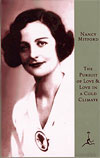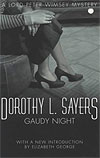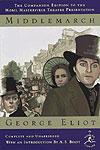
The Pursuit of Love
By Nancy Mitford
Here is the ultimate eccentric English family: a constantly enraged father, a vague mother, and the passel of children, who are always mischievous and hiding in the cupboard under the eaves. Linda is the glamorous, fearless, funny, and life-loving daughter who's always crying over wounded animals. She grows up to fall in love with a man who is delighted that after good sex she laughs rather than cries. The ending is a romantic tearjerker—but with an ironic sting in its tail.
By Nancy Mitford
Here is the ultimate eccentric English family: a constantly enraged father, a vague mother, and the passel of children, who are always mischievous and hiding in the cupboard under the eaves. Linda is the glamorous, fearless, funny, and life-loving daughter who's always crying over wounded animals. She grows up to fall in love with a man who is delighted that after good sex she laughs rather than cries. The ending is a romantic tearjerker—but with an ironic sting in its tail.

Gaudy Night
By Dorothy L. Sayers
In this elegantly written thriller-romance set in the 1930s, Harriet Vane is a writer romantically pursued by Lord Peter Wimsey, an aristocratic amateur detective who has cleared her of a murder charge. She resists his marriage proposal because she fears that his having saved her—and his enormous wealth—will make her indebted to him. Together they track down a vandal who has struck at her old college. Having succeeded in this partnership of equals, Harriet is convinced that she should get over herself and marry this obviously perfect man. I turned to it in a moment of despair last fall, as a kind of particularly delectable brain candy.
By Dorothy L. Sayers
In this elegantly written thriller-romance set in the 1930s, Harriet Vane is a writer romantically pursued by Lord Peter Wimsey, an aristocratic amateur detective who has cleared her of a murder charge. She resists his marriage proposal because she fears that his having saved her—and his enormous wealth—will make her indebted to him. Together they track down a vandal who has struck at her old college. Having succeeded in this partnership of equals, Harriet is convinced that she should get over herself and marry this obviously perfect man. I turned to it in a moment of despair last fall, as a kind of particularly delectable brain candy.

Little Women
By Louisa May Alcott
Of course I loved it as a girl, because there was Jo, who had a bad temper and loved to write (I could identify). Later I was touched by its serious look at the conflicts between duty and desire. Jo finds both love and work—her beloved professor declares himself to her under an umbrella—a scene that resulted in my spending far too many years venturing out into rainstorms. Reading it again, aloud, with my daughter when she turned 10 was one of the great joys.
By Louisa May Alcott
Of course I loved it as a girl, because there was Jo, who had a bad temper and loved to write (I could identify). Later I was touched by its serious look at the conflicts between duty and desire. Jo finds both love and work—her beloved professor declares himself to her under an umbrella—a scene that resulted in my spending far too many years venturing out into rainstorms. Reading it again, aloud, with my daughter when she turned 10 was one of the great joys.

Middlemarch
By George Eliot
In this 19th-century novel, Dorothea Brooke is a serious woman who makes a disastrous first marriage for the most idealistic reasons. We see her disillusionment—she realizes that the man she thought was wise is in fact mediocre. While her more blissful second union means that she can never fulfill her youthful dreams of social reform, I'm always satisfied to see the interesting, less conventional woman living better than the vain blonde.
By George Eliot
In this 19th-century novel, Dorothea Brooke is a serious woman who makes a disastrous first marriage for the most idealistic reasons. We see her disillusionment—she realizes that the man she thought was wise is in fact mediocre. While her more blissful second union means that she can never fulfill her youthful dreams of social reform, I'm always satisfied to see the interesting, less conventional woman living better than the vain blonde.

Mrs. Dalloway
By Virginia Woolf
This novel demonstrates that the ordinary life of a woman can be rich in meaning. It takes place in just one day, the day of a party, and yet we learn as much about the pleasures and sorrows of life as we do from books that deal with great men's progress across the world's great stages. We share Clarissa Dalloway's joys—in beautiful weather, in flowers, in gloves and shoes, in the familiar objects of her home—and we see them as precious and vital.
By Virginia Woolf
This novel demonstrates that the ordinary life of a woman can be rich in meaning. It takes place in just one day, the day of a party, and yet we learn as much about the pleasures and sorrows of life as we do from books that deal with great men's progress across the world's great stages. We share Clarissa Dalloway's joys—in beautiful weather, in flowers, in gloves and shoes, in the familiar objects of her home—and we see them as precious and vital.

The Dead
By James Joyce
For anyone with Irish blood, or anyone who wishes she had some, this story [included in Dubliners] packs a wallop. Joyce first appears to be telling a rather comic short story of a boring party given by the begrudging hero's maiden aunts, replete with guests that make you want to flee outside for a cigarette. Ultimately, it's about the love that transcends jealousy and death—as well as the limitations of both lover and beloved.
By James Joyce
For anyone with Irish blood, or anyone who wishes she had some, this story [included in Dubliners] packs a wallop. Joyce first appears to be telling a rather comic short story of a boring party given by the begrudging hero's maiden aunts, replete with guests that make you want to flee outside for a cigarette. Ultimately, it's about the love that transcends jealousy and death—as well as the limitations of both lover and beloved.
Babette's Feast
By Isak Dinesen
The basic plot: Two aging Norwegian maiden sisters, the daughters of the leader of a puritanical religious sect, take in a French woman who has fallen upon hard times and who turns out to be a marvelous cook. After many years, she discovers she has won a lottery and spends her entire winnings on a fabulous dinner she creates for the sisters and their fellow congregants in gratitude. She gives everything of herself and, in doing so, transforms the Norwegians, who learn that not only virtue and self-denial but pleasure and beauty can show the path to grace.
By Isak Dinesen
The basic plot: Two aging Norwegian maiden sisters, the daughters of the leader of a puritanical religious sect, take in a French woman who has fallen upon hard times and who turns out to be a marvelous cook. After many years, she discovers she has won a lottery and spends her entire winnings on a fabulous dinner she creates for the sisters and their fellow congregants in gratitude. She gives everything of herself and, in doing so, transforms the Norwegians, who learn that not only virtue and self-denial but pleasure and beauty can show the path to grace.




